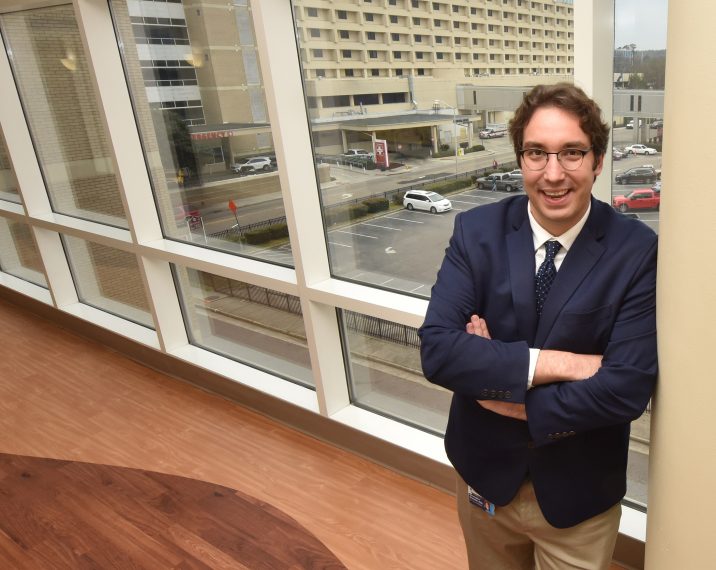We’ve all heard the expression “sleep like a baby.”
Unfortunately, as children get older, some develop bedtime issues that make those days of sleeping so deeply and soundly seem like a distant memory.
“A lot of things can affect sleep,” says Dr. Chris Drescher, a pediatric psychologist at the Medical College of Georgia at Augusta University and AU Health. “Whether the problem is getting to sleep or staying asleep, some minor changes could have a major effect.”
One of the changes he suggests is always keeping a schedule. “When there is a lack of schedule around sleep, we know that’s related to poor sleep overall,” he explains. “That means set bedtimes and set wake times, with the most important being set wake times, because if you go to bed really late and still have to wake up early, you’re more likely to get right back on schedule the next night.”
Those with trouble sleeping should also keep the schedule on the weekends and school holidays, when kids tend to want to stay up later and sleep longer. School age children should be getting between 8-10 hours of quality sleep per night.
Other changes Drescher recommends include:
- Stay away from stimulants. “Caffeine can be active in your body for up to 12 hours after ingestion, so if a teenager is stopping on the way home from school to get an energy drink, that can cause problems with sleep,” he says. Many medications may also act as stimulants. If a child has recently started a new medicine and developed issues with sleep, that’s something to talk with their physician about. “It may not mean stopping the drug. It could just mean changing the timing or dosing, or trying a similar drug that doesn’t have the effect sleep.”
- Limit screen time. “We know screen time is strongly associated with sleep — not just using screens leading up to bed, but looking at a screen all day is associated with less sleep and poorer sleep quality, Drescher says. “There are a variety of screens like smart phones, video games, televisions. The light exposure is the problem. Our brains are prone to associate light with the sun, so looking at the light tricks the brain into thinking it’s daytime and we should be awake.”
He recommends turning screens off 60-90 minutes before bedtime and concentrating on other activities like reading instead.
- Stay out of the bed when you’re not sleeping. “Spending time in bed doing activities other than sleeping is not good for sleep,” he says. “One of the key offenders would be watching television, but also just chatting on your phone in bed, doing homework in bed, eating in bed. We want the brain to associate the bed with nothing but sleep.” Children, particularly those who have trouble sleeping, should have a chair or work/play area in their room, so activities can be done there and not on the bed.
Along those same lines, Drescher recommends getting out of the bed when you can’t fall asleep. “We don’t want someone to lay in bed for hours tossing and turning,” he says. “If it takes more than about 30 minutes to fall asleep, they should get up, find a comfortable chair and do something incredibly boring until they start to feel drowsy, then go back to bed.”
Children struggling with sleep also shouldn’t have an alarm clock they can see in their rooms. “We don’t want them to be stressing and staring at the clock when they can’t fall asleep. Worry like that can also get in the way of sleep,” he explains.
- Avoid eating too close to bedtime. “Sleep is a unified experience,” Drescher says. “It’s not just your brain’s time to rest. If your body is trying to digest a large meal, you’re not going to sleep as well. Small snacks are ok though.”
- Avoid alcohol and tobacco. “Unfortunately that’s something we have to think about, even with kids. Many teens are using e-cigarettes these days. Tobacco is a stimulant and can interfere with sleep.”
- Develop a nighttime routine and stick to it. A warm bath or shower with time to let the body cool down is a signal to the brain that it’s close to bedtime. It’s also best to sleep in a cool, quiet place. “There is some evidence that temperature may even be a stronger cue to the brain than light,” he says.
If you’ve tried some of these things and you child is still having problems with sleep, that’s a good time to consult with your pediatrician. “There are non-behavioral things that can affect sleep, like sleep apnea for example,” Drescher says. “In that case, all of these recommendations will not necessarily help. That has to be managed differently.”
The National Sleep Foundation’s Sleep Awareness Week is March 8-14.
 Augusta University
Augusta University




